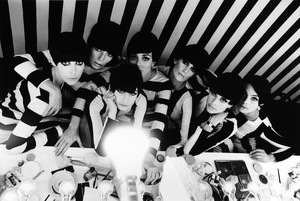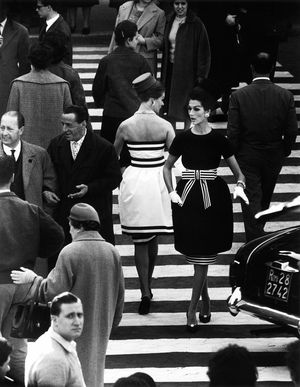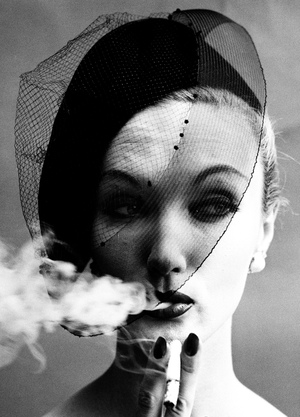Try to put him in a box and he'll find his way out. Still working at nearly 85 years old, William Klein has gone rogue in at least four different fields: abstract painting, photography, filmmaking and commercial copy writing.
Klein now lives in Paris but I caught up with him in New York City — the place where he was born, but no longer has much affinity for. He's just here to promote a new book, William Klein ABC.
When I ask him what he thinks about the city, he says:
"One thing that annoys me is the talk. I went into Starbucks, and I wanted tea — and there was a cookie. 'Starbuck's outrageous oatmeal cookie.' What do you mean outrageous? Everybody says, 'Have a nice day.' There's a lot of bull- - - - in the talk."
"People don't do that in Paris?" I ask.
"They don't do that," he replies. "They're much cooler."

William Klein, circa 1990s
As a young man, after being in the military, Klein got a scholarship to the Sorbonne in Paris and started doing abstract painting. He was influenced by the artist Fernand Leger.
"He didn't talk arty-farty," says Klein. "He would say, 'That is cool, that is strong, keep it up.' And that's it. No fancy-schmancy art talk." Leger told him: "Get out of the galleries. Look at buildings; go out onto the street."
It was advice that served Klein well — not only in painting but also in photography and film.
After some of his work was shown in Paris, he was approached by an editor of Vogue magazine, who invited him to New York as an assistant art director. But when Klein got there, he says, "I saw all these women with hats and harlequin glasses walking around with a shoe or a piece of cloth or something, and [the editor] said, 'You wouldn't last one day in this place. Take photographs.' "
And that's what he did. Vogue paid for cameras and equipment. And the result was an extraordinary book of photographs that was published in Europe — but was considered too edgy for the U.S.
"The photographs I took at the time," says Klein, "were the least publishable photographs anybody was taking. I showed the photographs to a couple of editors I knew. They said, 'You make New York look like a slum.' I said, 'What do you know about New York? You live on Fifth Avenue. You come to the office on Madison. What do you know of the Bronx? And Queens? New York is a slum.' "
He later did similar books on Rome, Moscow,Tokyo and Paris: Rich, chaotic portraits of people and life on the street.
Vogue wanted that look on its pages. But still, Klein says, "fashion had no interest for me. I would take photographs in the studio. I would go back home and my wife would say, 'What is the fashion like for this season?' And I would say, 'I have no idea.' "
He laughs heartily. But fashion photography did subsidize his interests.
Klein later satirized the entire industry in the film Who Are You Polly Maggoo?, which asks: What's below the surface of a supermodel?
He also went to Africa and made a film about Eldridge Cleaver, the Black Panther leader. He made a film about Muhammed Ali's huge personality, just at the time he embraced Islam and changed his name. They were art films, and none of them were commercially successful. But Klein has never seemed to care.
One approach to life is a programmed path to a clear-cut career — choose early and don't deviate. But William Klein suggests that life can be the exact opposite of that, full of deviation.
"If I look back," he says, "I think most of the things I did — the films, the books, the collaborations with these magazines — were mostly by accident."
Perhaps that's why he is so free, so multifaceted and so irreverent.
9(MDE1MTIxMDg0MDE0MDQ3NTY3MzkzMzY1NA001))
Transcript
AUDIE CORNISH, HOST:
Finally this hour, a visit with influential photographer William Klein. He's nearly 85 years old and still working. Klein's style is hard to define, but he's always challenged convention: hazy fashion photos featuring beautiful women in unbeautiful places, grimy street scenes, people staring into the cameras seeming to ask why you're looking at that them. Klein's work has been mounted on museum walls, and now, it's collected in a new book. Klein lives in Paris, but NPR's Margot Adler recently met him in New York City.
MARGOT ADLER, BYLINE: William Klein has been a maverick in at least four different fields. He's been an abstract painter, a photographer, a fashion photographer, a filmmaker, a writer of commercials. I caught up with Klein in a hotel room in New York City, the place where he was born but a place he no longer knows or has much affinity for. When I ask him for his views on the city, he said:
WILLIAM KLEIN: One thing that annoys me is the talk. I went into Starbucks, I wanted tea, and there was a cookie - a Starbucks "outrageous oatmeal cookie." What do you mean outrageous? Everybody saying have a nice day and...
ADLER: People don't do that in Paris?
KLEIN: They don't do that. They're much cooler.
ADLER: A sense of irony infuses all his photographs and films. As a young man, after being in the military, he got a scholarship to the Sorbonne and started doing abstract painting. He was influenced by the artist Fernand Leger.
KLEIN: He didn't talk arty farty. He would say that's cool. That's strong. Keep it up. No fancy, schmancy art talk.
ADLER: Leger told him: Get out of the galleries, look at buildings, go out onto the street. It was advice that served Klein well, not only in painting but in photography and film. After some of his artwork was shown in Paris, he was approached by an editor of Vogue who said come to New York and be an assistant art director. But when Klein got there:
KLEIN: I saw all these women with hats and harlequin glasses walking around with a shoe or a piece of cloth or something. He said, well, look around. You wouldn't last one day in this place, take photographs.
ADLER: And that's what he did. Vogue paid for cameras and equipment. The result was an extraordinary book of photographs that was published in Europe but was considered too edgy to for the U.S. Vogue didn't want to touch it.
KLEIN: The photographs I took at that time were the least publishable photographs anybody was taking.
ADLER: He showed the photographs to a couple of editors.
KLEIN: They said, well, you make New York look like a slum. I said, what do you know about New York? You live on Fifth Avenue. You come to the office on Madison. What do you know about the Bronx and Queens, everything? New York is a slum.
ADLER: He later did similar books on Rome, Moscow, Tokyo, Paris, rich portraits of people and life on the street. Then Vogue said to him: We are, after all, a fashion magazine. Try your hand at fashion photography. But Klein found most fashion photos boring. He decided to use a telephoto lens, to put the models out in the street, in traffic, in crowds. And Vogue liked the photos.
KLEIN: Fashion had no interest for me. I would take photographs in the studio. I'd go back home, and my wife would say, what's the fashion like for this season? And I would say, I have no idea.
ADLER: But fashion photography did, he says, allow him to go from photography poor - someone with one camera and two lenses - to photography rich. And later, he satirized the entire industry in a film called "Who Are You, Polly Maggoo?," a film which asks: Is there anything below the surface of a supermodel?
KLEIN: I thought I would deal with television, with media, with brainwashing, and fashion was part of that.
ADLER: None of his films were commercially successful. They were art films. Klein went to Africa and made a film about Eldridge Cleaver, the Black Panther leader, when he jumped bail and went to Algiers. He made a film about Muhammad Ali and his huge personality, just at the time Ali embraced Islam and changed his name.
(SOUNDBITE OF ARCHIVED BROADCAST)
MUHAMMAD ALI: I'm not scared of nothing but God. I'm not scared of you, and you run the country.
ADLER: Klein tells one great story about seeing an empty seat on a plane next to Malcolm X. Klein says Malcolm X was so controversial at the time, no one wanted to sit next to him. So he did, and it helped Klein get an in with Muhammad Ali. Then there was his film "Mr. Freedom," a satire of American patriotism during the Cold War with a hero wearing football pads and a big F for freedom on his chest.
(SOUNDBITE OF MOVIE, "MR. FREEDOM")
UNIDENTIFIED MAN: (as character) We are surrounded by a red sea, a red sea of blood, the anti this, the anti that, the jealous, the misfits, the failures. We're not afraid of anybody, an eye for an eye, a tooth for a tooth.
ADLER: Klein came to New York to promote his book "William Klein ABC," which has photographs of his paintings, his city street photos from around the world and stills and posters from many of his films. In today's world, people tend to think they have to follow a programmed path to a worthwhile career, to choose early and never deviate. But when you listen to William Klein, you realize that his life has been the exact opposite of that.
KLEIN: If I look back, I find that most of the things I did - the films, the books, the collaborations with these magazines and so on - were mostly by accident.
ADLER: Perhaps that's why he's so free, so multifaceted and so irreverent. Margot Adler, NPR News, New York. Transcript provided by NPR, Copyright NPR.
300x250 Ad
300x250 Ad















